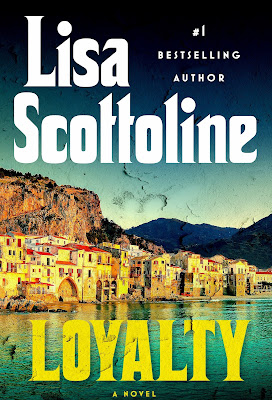The Washington Times ran my On Crime column on Lisa Scottoline (seen in the below photo) and Loyalty, her historical thriller about the first Sicilian Cosa Nostra crime family.
You can read the column via the below link or the below text:
BOOK REVIEW: 'Loyalty' - Washington Times
I was drawn to “Loyalty,” Lisa Scottoline’s historical novel
about Sicily, because I’ve enjoyed her novels in the past, and because I’m half
Sicilian on my late mother’s side and I visited that beautiful island many
years ago. I remember Sicily’s wonderful scenery, food and people, and as a
student of crime, I was and remain fascinated with Sicily’s darker side.
Speaking to her last year, I discovered that we are originally
from the same Italian American neighborhood in South Philadelphia, and we lived
around the corner from each other when we were young.
I contacted her and asked how she would describe “Loyalty,” and
why she chose that title for the historical novel.
“I think ‘Loyalty’ is a fast-moving historical thriller about
the first Mafia family of Sicily and the young crusading lawyer who sets out to
oppose them and find justice for a young, kidnapped boy,” Ms. Scottoline
replied.
“I entitled the novel ‘Loyalty’ because loyalty is such a
wonderful concept, in that it can be a double-edged sword, in that it’s a
virtue until it’s taken too far. Writers have a saying that ‘the villain is the
hero of his own story,’ and I think that’s true in the novel, because even the
characters who do bad have convinced themselves that they are doing good,
because they are loyal to a person or principle. I leave it to the reader to
decide which is which, because I respect my readers so much.”
How did you research “Loyalty”?
I visited Sicily and traveled all over, setting unique locations
for the novel, like a convent that is also a bakery, an underground church
where a secret society met, and the awful sulfur mines in the center of the
island. I even filmed videos, so readers could see them on my website as a
companion piece to the novel. I also steeped myself in Sicilian culture and
literature, reading di Lampedusa, Verga and Vittorini, among many others.
Was your character Franco Fiorvanti based on a real Sicilian
criminal in history? How would you describe him?
Franco was not based on any mafioso in particular, but I read
everything I could about the history of the Mafia and was amazed to learn that
the term mafioso is a Sicilian term that means bold, brave, and essentially,
having swagger. As soon as I learned that, it clued me into Franco’s character,
because he starts the novel as a lemon grower in a feudal society that
oppresses him, and partly because he is unable to move up in that society and
enjoy the freedoms that Americans like us take for granted, especially in
modern times.
Did the evolution of the Sicilian Cosa Nostra take place like
you describe in the novel?
The history of the Mafia as depicted in “Loyalty” is exactly
true to the facts. I’m a former lawyer and adjunct law professor, and so I am
very aware that many people get their ideas about law, justice, and crime and
punishment through fiction. I always feel like I have a special responsibility
to get the facts right, and frankly they were fascinating here.
I was amazed to see that the Mafia was born in the lush lemon
groves of Palermo and came into being largely because lemons became such a
valuable crop when the British navy kept contracting scurvy. Lemon crops were
so valuable that they needed protection, and armed guards like Franco protected
them, but that protection soon turned into what is known as a modern-day
protection racket.
Your character Gaetano Catalano was a member of Beati Paoli,
which was a real organization. How would you describe the group?
I was astounded to learn about the blessed Society of St. Paul,
or the Beati Paoli, which really was a secret organization in Palermo in the
1800s. It was composed of aristocrats who felt compelled to fight injustice for
the common man, even though they benefited from the feudal system that tilted
the law in their favor.
They were guided by their faith in God and specifically the
teachings of St. Paul, and it struck me as so brave of them and
forward-thinking. In addition, it informs the backdrop of the novel in that
religion and law can give all of us a way to conduct our lives that affords
dignity and respect to everyone.
Other than having been entertained, what takeaways would you
like your readers to glean from “Loyalty”?
“I have written 35 contemporary thrillers in as many years, and
I have been president of the Mystery Writers of America, so I think I bring my
thriller chops to bear in historical fiction, especially “Loyalty.” I really
think of the novel as impossible to put down, with fast-paced drama, riveting
action, and even romance set against the ruggedly beautiful island of Sicily.”
Paul Davis’ On Crime column covers true crime, crime fiction and
thrillers.
•
Putnam, $28, 432 pages.




No comments:
Post a Comment